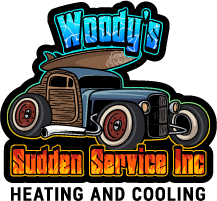
We spend a lot of time inside. In fact, the Environmental Protection Agency (EPA) has determined being within a building comprises 90% of our time. However, the EPA also has determined your indoor air can be three to five times more polluted than outside your home.
That’s since our houses are securely sealed to boost energy efficiency. While this is fantastic for your utility costs, it’s not so great if you’re among the 40% of the population with respiratory allergies.
When outdoor ventilation is insufficient, pollutants including dust and volatile organic compounds (VOCs) may get captured. As a consequence, these pollutants can irritate your allergies.
You can enhance your indoor air quality with fresh air and usual cleaning and vacuuming. But if you’re still having issues with symptoms when you’re at home, an air purifier might be able to help.
While it can’t remove pollutants that have settled on your furnishings or carpet, it may help clean the air traveling around your house.
And air purification has also been scientifically verified to help lessen some allergic symptoms, according to the American College of Allergy, Asthma and Immunology. It might also be useful if you or someone in your household has a lung condition, such as emphysema or COPD.
There are two options, a portable air purifier or a whole-home air purifier. We’ll go over the advantages so you can determine what’s appropriate for your residence.
Whole-House Air Purifier vs. Portable Air Purifiers
A portable air purifier is for one room. A whole-house air purifier works alongside your HVAC equipment to clean your complete house. Some kinds can clean independent when your HVAC system isn’t running.
What’s the Best Air Purifier for Allergies?
Go after an option with a High Efficiency Particulate Air (HEPA) filter. HEPA filters are used in hospitals and provide the most comprehensive filtration you can buy, as they eliminate 99.97% of particles in the air.
HEPA filters are even more powerful when used with an ultraviolet (UV) germicidal light. This powerful combination can wipe out dust, dander, pollen and mold, all of which are general allergens. For the greatest in air purification, think over a system that also has a carbon-based filter to decrease household odors.
Avoid using an air purifier that generates ozone, which is the top ingredient in smog. The EPA cautions ozone could irritate respiratory troubles, even when emitted at minor concentrations.
The Allergy and Asthma Foundation of America has compiled a listing of questions to ask when purchasing an air purifier.
- What can this purifier remove from the air? What doesn’t it extract?
- What’s its clean air delivery rate? (A bigger figure means air will be purified more quickly.)
- How regularly does the filter or UV bulb need to be switched]? Can I complete that by myself?
- How much do replacement filters or bulbs cost?
How to Lessen Seasonal Allergy Symptoms
Want to have the {top|most excellent|best] results from your new air purification system? The Mayo Clinic advises completing other measures to reduce your exposure to problems that can cause seasonal allergies.
- Stay in your home and keep windows and doors sealed when pollen counts are elevated.
- Have other household members cut the lawn or pull weeds, since these tasks can aggravate symptoms. If you must do these jobs alone, consider using a pollen mask. You should also rinse off right away and put on clean clothes once you’re finished.
- Avoid hanging laundry outdoors.
- Run the AC while at your house or while driving. Consider installing a high efficiency air filter in your home’s heating and cooling system.
- Even out your home’s humidity levels with a whole-house dehumidifier.
- Hardwood, tile or linoleum are the ideal flooring kinds for lowering indoor allergens. If your house has carpet, use a HEPA filter on your vacuum cleaner.
Let Our Specialists Handle Your Indoor Air Quality Necessities
Prepared to take the next step with adding a whole-house air purifier? Give our specialists a call at 703-291-0095 or contact us online to request an appointment. We’ll help you find the right unit for your family and budget.
